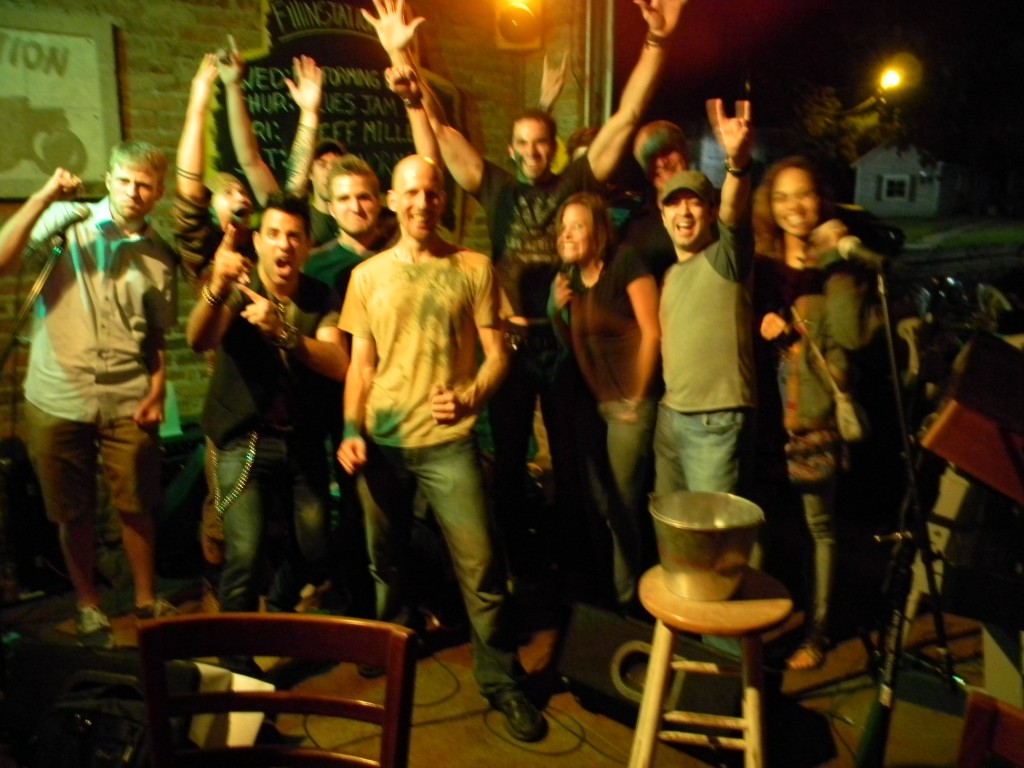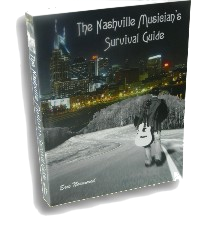Singing
Judy Rodman on “Singing in the Studio” at the Nashville Berklee Jam
Our guest speaker for the June, 2014 Nashville Berklee Jam was award-winning vocal coach, Judy Rodman. In this in-depth workshop she covers many facets of the most challenging endeavor a vocalist will encounter, singing in the studio. Here are some highlights from her talk (her entire presentation can be viewed below).
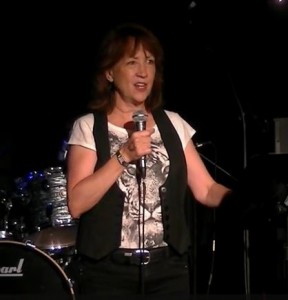 “The studio is an odd place to sing, it’s very artificial…it requires perfection, because the mic is really sensitive… and recording is forever.”
“The studio is an odd place to sing, it’s very artificial…it requires perfection, because the mic is really sensitive… and recording is forever.”
To optimize a studio performance, Judy offered many practical pieces of advice:
- Make sure that you get the cue mix that you want.
- Make sure you get the right amount of reverb.
- Try singing with one side of the headphones on and one side half off. This allows you to “be a little grounded in the room acoustically”.
- Take some things out of the mix that are swimmy or distracting.
- When singing lead, experiment with tracking the song in sections, for instance verses first, then a high chorus
- Regarding tuning and compression – “You want to sing as well as possibly can so you can use as little of that correction as possible…then the song is going to sound more natural and you’ll be in control.”
One reason that singing in the studio is hard is that you are missing an audience. Most singers that are new to singing in the studio tend to look down at the mic. “I can’t think of any song I’ve ever heard that the lyrics were directed to the mic, and when you sing to the mic that way, it’s going to sound like you’re not singing to anyone.” To remedy this, Judy’s suggests singers don’t face the control room. Face a corner or somewhere you’re not distracted and imagine you’re singing in a concert hall. “Create your own holideck.”
Another thing that makes studio singing hard is that most studio settings are not set up for optimal singing. “I’ll bet you 95% of the studio’s I ever go into, the mic is not set up, the music stand is not set up, the cue box is not set up in ways that would help a singer automatically have the best breath control.” During her talk, she demonstrates the proper way to place a mic stand, music stand and cue box to give the singer the space they need to optimize breath control. “Move the music stand and cue box back a little.” The singer shouldn’t have to lean forward to reach the mic.
Regarding multiple takes of a vocal, sometimes an engineer or producer might say, “okay, this pass, give me everything you’ve got!”. This doesn’t mean to push harder. Often, the louder you sing, the smaller you sound. The louder you sing, the more they have to pull you back because your pinging the meter. And you lose resonance. “More is two things – passion and resonance.” The magic formula is “back off the pressure, add passion”. The power comes from your butt, hence the phrase “sing your butt off!”
Lastly, “You want to know how to maximize your efforts so you get magic”. Know how to prepare for the studio, know your songs backwards and forwards, know your keys and tempos. The day of your vocal session – get a massage, drink water like a fish, watch what you wear (noisy fabrics, ball caps, sun glasses – don’t let anything come between you and the vocal).
Judy Rodman is an award winning vocal coach, session singer, recording artist, stage and television performer, songwriter and vocal producer. Named ‘Best Vocal Coach” by NashvilleMusicPros.com and “Vocal Coach in Residence, August 2013” by TC Helicon’s Voice Council Magazine, Judy teaches her trademarked vocal training method “Power, Path and Performance”™ to singers and speakers nationally and internationally in her office, by phone and Skype. She is a published author with several professional vocal courses; her “All Things Vocal” blog has over ½ million views. Her vocal clients include major and indie recording artists and labels, touring and studio background singers, national public speakers and voiceover talent. She has had #1 records as an artist, songwriter and producer, and won ACM “New Female Vocalist” and BMI Millionaire awards. She is member of NATS, AFTRA, SAG AFofM, BMI. Judy’s vocal students include: Kacey Musgraves, Mat Kearney, Pam Tillis, Dakota Bradley, Radney Foster and Brian White, to mention a few. To learn more about Judy or for more practical vocal tips please visit her website, JudyRodman.com.
The Berklee Nashville Jam is a bi-monthly event held on the last Monday of every other month at the Rutledge and hosted by Berklee alum, Eric Normand ‘89. The event, which is open to the public, is free for alumni and a guest; and $5 for non-alums. After the guest speaker, attendees are welcome to jam with the house band and others from the Nashville music community. For more information about the Berklee Nashville Jam, visit www.nashvilleberkleejam.com.
Judy’s Talk
https://www.youtube.com/watch?v=gicktGzuIY8
‘Perspiration not Inspiration’ Ben Hayslip talks Songwriting at the Nashville Berklee Jam
Our latest Nashville Berklee Jam at the Rutledge was a great success. This was our most well attended event to date during which we were treated to a master class about songwriting and some inspired performances during the jam that followed. On this night we were very fortunate to have hit songwriter and Peach Pickers member, Ben Hayslip as our special guest. I would like to thank fellow alum and guest blogger Shantell Ogden ’05 for writing the following article.
‘Perspiration not Inspiration’ Ben Hayslip talks Songwriting at the Nashville Berklee Jam
By Shantell Ogden, ‘05
Ben Hayslip found his way from Evans, Georgia to the top of the country music charts. And, we were lucky enough to hear his story at the most recent Nashville Berklee Jam at The Rutledge in downtown Nashville, hosted by Eric Normand. 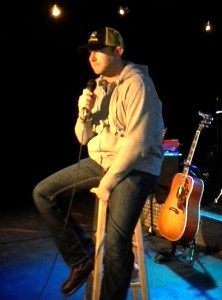
Ben attributes his success in the music business to three things: refusing to fail, working hard at it every day and writing songs that he loves.
But navigating the industry wasn’t always an easy journey for Ben, who took his mom’s advice and moved to Nashville in 1994 to join his childhood friend Rhett Akins (who then had a record deal).
On one hand, Ben had three publishing offers after his first year in Nashville to choose from. He had his first cuts within a couple of years with Trace Akins and Blackhawk. Other successes in his career, though, he worked for years to see.
“I spent a lot of years trying to be someone I just wasn’t,” says Ben. “I was trying to write songs that I thought other people would like, and put more chords in them because I thought I should. The moment I started to forget about what was on the radio and just write what I loved, things started to change in my career.”
Ben had built up a successful company selling ball caps on the side while writing songs to provide for his growing family. He would sell caps from 7:00 a.m. until 1:00 p.m. every day, then write in the afternoon. His business was really taking off when he got a call from Rusty Gaston.
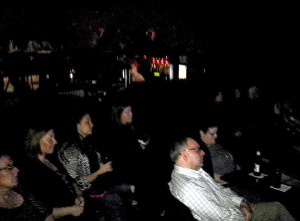 Rusty was starting a new publishing company, This Music, and he wanted Ben to be his first signed writer, but there was a condition.
Rusty was starting a new publishing company, This Music, and he wanted Ben to be his first signed writer, but there was a condition.
“Rusty told me that he would only sign me if I focused on 100 percent on writing songs, not selling ball caps,” Ben recalls. “He said that he believed that I had it in me to be a songwriter of the year. It was a really important shift in my focus and career.”
Haylip’s career really started to hit a new level when he focused on writing songs and ‘doing what he loved.’ When Ben and Rhett connected with Dallas Davidson, something even more magical started to happen.
“We just instantly knew each other because we had all grown up in Georgia,” says Ben. “They understood who I was. We started writing songs that we loved and wanted to listen to, and it turns out that other people loved them too.”
Their ‘tailgate and truck’ songs resonated with people and redefined country music. The songwriting trio, known as the Peach Pickers, has churned out dozens of hits in recent years, Ben with 15 number ones in five years to his credit.
“Even though I have a lot of songs in my catalog I can’t sing, I can sing and play every one of my hit songs,” says Ben. “I’m not the best musician or singer, but I think that if I can sing it so can Bubba driving down the road in his truck. There’s something to that kind of
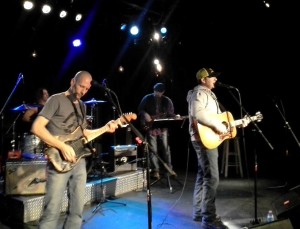
Ben Hayslip performing hits with Eric Normand (guitar), Mike Chapman (bass) and Nick Forchione (drums).
simplicity.”
Ben recognizes that even though tailgates and trucks are still very real to him because of his rural roots, country music needs to shift into something different because “it’s all been done.” He’s working on figuring out what’s next every day he writes.
So what’s next for this two-time Songwriter of the Year winner?
“I’d really like to someday be inducted into the Georgia Music Hall of Fame along with some of the legends I grew up listening to like Ray
Charles and Otis Redding,” he says.
Given his work ethic, long list of success and passion for doing what he sets out to do, I have no doubt that it’s just a matter of time.
For more information about Ben, find him on facebook or follow him on twitter. You can also watch Ben’s talk and performances in their entirety below, special thanks to Jack Zander for videotaping this event.
http://www.youtube.com/watch?v=flAH56OPHRc&feature=youtu.be
http://www.youtube.com/watch?v=HTz1gzvhbvI&feature=youtu.be
http://www.youtube.com/watch?v=JQlUYv5rq9M&feature=youtu.be
http://www.youtube.com/watch?v=s-OsurnB0PQ&feature=youtu.be
The Berklee Nashville Jam is a bi-monthly event held on the last Monday of every other month at the Rutledge and hosted by Berklee alum, Eric Normand ‘89. The event, which is open to the public, is free for alumni and a guest; and $5 for non-alums. After the guest speaker, attendees are welcome to jam with the house band and others from the Nashville music community. For more information about the Berklee Nashville Jam, visit www.nashvilleberkleejam.com.
Nashville Performance Coach, Diane Kimbrough speaks at the Nashville Berklee Jam – October 28, 2013
Monday, October 28 was another great Nashville Berklee Jam, and our special guest on that night was Nashville’s most in-demand performance coach, Diane Kimbrough. Early on in her talk Diane addressed the essence of performance coaching.
“Why do we need live performance coaching, why isn’t it good enough to just play great music…? We don’t make money from music, music is free. 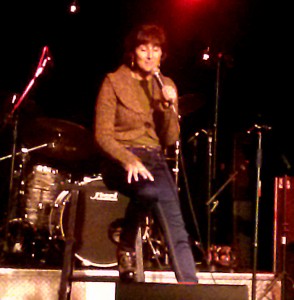 Artists make money from touring and from merchandise… You have got to give an audience a tremendous experience that is beyond what the music is, otherwise why are they going to pay $75 for a concert ticket when they can get the music for free…”
Artists make money from touring and from merchandise… You have got to give an audience a tremendous experience that is beyond what the music is, otherwise why are they going to pay $75 for a concert ticket when they can get the music for free…”
She continued, “…That’s why it’s so important for your success as an artist to really put a lot of effort into fine tuning your show and your relationship with three things on stage; your audience, your band, and your instrument”
She explained that you need to “create an experience” and that you need to “go deep into your music and find what speaks to your audience”.
The music that is dearest to my heart would be most American roots music recorded up to the mid-1970’s, music born of an era when the visual presence of an artist played a lesser role. Back then, the power of the music itself was more integral to an artist’s success. Well you know the old saying, “video killed the radio star”. As much as I would rather just get lost in my music during a live performance, I do realize that if I fail to acknowledge my audience and bring them into the show they are less likely to “get” my music. After all, it’s no longer 1969, and I’m not performing at the Fillmore.
Diane continued, “Everything you do on stage should be a reflection of what you’re doing musically and lyrically…How might somebody else think about your song?… They’re not into how cool you play it but how you make them a part of it.”
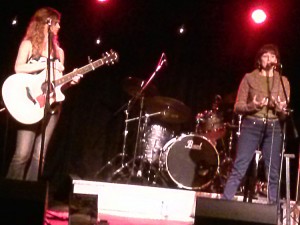 To demonstrate how this works, Diane critiqued several performances throughout the night. After each performance Diane would make some critiques and suggestions, and then the performer tried it again with the new ideas in mind. I must say that everybody showed immediate improvements. I even put myself on the chopping block, performing one of my originals. Diane stopped us half way through the first verse and asked
To demonstrate how this works, Diane critiqued several performances throughout the night. After each performance Diane would make some critiques and suggestions, and then the performer tried it again with the new ideas in mind. I must say that everybody showed immediate improvements. I even put myself on the chopping block, performing one of my originals. Diane stopped us half way through the first verse and asked
“Who are you playing for?”
“I’m playing for you guys”, I answered.
“You could’ve fooled me, because you came up and started looking right there at the floor, and there’s all of us out here that missed you on that wonderful intro.”
I explained that I was actually looking down at my left hand on the guitar, which happens to be in line with the floor, perhaps a habit that many of us guitar players have.
“You’re up there for us to have a good time… you have to engage us visually. That’s not just you, that’s for everybody”, Diane commented, motioning to the other players in my band. “Otherwise, you’re playing for yourselves, and you can do that in your bedroom. The song doesn’t start when the lyrics start, the song starts when you walk on stage.”
We tried the song again, but this time I made it a point to look ahead and into the crowd, making eye contact with several people while engaging in a few visual enhancements. I have to say that the performance was instantly more powerful, drawing a more notable response from the crowd. After the second chorus of the song Diane stopped us midway through my guitar solo.
“What I’m getting is ‘I’m playing this cool music’, what I want you to play is, ‘let me give you a gift of this cool music’. I want you to play, ‘hey guys, listen to this, this is for you’. You’re not playing it because it’s cool, you can do that in your bedroom. You’re playing it because you want them to have this. Give it away as a gift…do the physical things that say this is for you.”
She also addressed my other bandmates.
“Mike (our bassist), you’re [conveying] hey man what do you think of this? And he’s going (motioning to our drummer), ‘man, that’s cool’. And you’re also [conveying] to the audience, ‘what do you think of this, want some of this?’
We tried the performance one last time and, needless to say, the different mindset not only translated into a deeper connection with our audience and a bigger response, but also made for a better musical performance. Diane commented on our improvements and finished her part of the night with a few more remarks.
“What you always have to do is stay aware of the reason that you’re there, which is, the audience. You’re there so that they have an experience, they’re not there so you have an experience. They really don’t care if you’re having a good time, if you get to have a good time that’s the icing on the cake… you have to translate everything you’re doing to the fact that your there so that they have a good time. God knows in this industry we’re not here for the money… you’re here because you want to make them have an experience, that’s why you get to keep coming up here and doing it, because you made them have an experience. If you love what you do and you want to keep doing it you have to do it because of the audience…after all, they paid the cover; they already gave something to you.”
If you’d like to learn more about Diane or e-mail her some questions, please visit her website.
The Nashville Berklee Jam is held at The Rutledge on the last Monday of every other month, with the next event to take place on Monday, February 24, (guest speaker TBA).
For more info about future events, please visit the Nashville Berklee Jam website NashvilleBerkleeJam.com
If you would like to learn more about the Nashville music industry, please check out my website and book “The Nashville Musician’s Survival Guide”.
A-list bassist and Union President, Dave Pomeroy speaks at the Nashville Berklee Jam; June 24, 2013
by Eric Normand
Long before recording with artists like Emmy Lou Harris, Alison Krauss, and Peter Frampton, Nashville Musicians Union President and our guest speaker on this night, Dave Pomeroy was learning how to play the standup bass in a school orchestra in Virginia. Growing up as the son of a military man, Dave experienced life in a few different places and also learned how to play the electric bass before eventually permanently relocating to Nashville in 1977. Following a musical heart inspired by the British Invasion, his foray into the world of the fretless bass would eventually come full circle when his skills landed him session work with Keith Whitley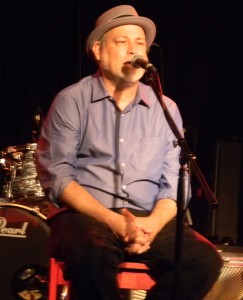 and Trisha Yearwood many years later.
and Trisha Yearwood many years later.
The road that led to A-team session work in the Nashville studio scene of the 80’s and 90’s was filled with a plethora of life and music enriching experiences. Working with the legendary Don Williams from 1980 to 1994 was a “journey into minimalism” which ultimately taught him the power of the song. Under the wing of this world-class songwriter and performer, Dave learned how to become a great songwriter, studio musician and producer in his own right.
“Don changed my life… these are all things he taught me, just by example and by encouraging me and giving me respect…”
A key moment in Dave’s life came 10 days after he finished recording on Keith Whitley’s fourth album, when the legendary singer died suddenly of an alcohol overdose.
“…It really shook me up and I realized that I was not at a good place in my life, I needed to change some things and make myself a happy person…it really did change my life and made me realize that life is precious and you better get on with what you’re trying to do…”
Dave continued on as an in-demand session player, his work with Keith Whitley ultimately leading to recording the bass tracks on Trisha Yearwood’s first seven albums as well as countless other major-label projects.
“One of the lessons that I really want to impart is that you have to listen to your inner voice when it talks to you, because if you don’t, it will stop talking…”
He joined the Nashville Musicians Union, AFM Local 257 in 1978, gradually becoming more and more involved in the years that followed. As the years rolled by he became frustrated with the status quo of the Union, feeling there was a growing “disconnect between players and leadership”. In 2008 he ran for union president and won the election. Dave shared that the Musicians Union has totally changed, both here and nationally and spoke about its role in regards to the rights of the individual musician.
“It’s really about trying to spread the word that it’s okay to take care of business, and not all musicians are good at that…in this day and age, if you don’t protect yourself who’s going to? If the Musicians Union doesn’t have your back, it’s you against the music business, good luck with that, it works for some people, but at the same time it’s good to know that there are resources and that you do have something you can fall back on.”
One of his roles as union president is fighting for musician and songwriter rights to be paid for their work, and the reality of digital piracy.
“We’ve been through this terrible thing with digital piracy… it really just decimated the way things were. But now we’re starting to see that people are actually understanding that it’s not that big of a deal to spend $1.29 or $.99 to buy a song instead of stealing it, and that if you want to have a music business in the future it may not be there if you’re not willing to pay for stuff…it’s okay to be a consumer, it’s okay to be a fan, I’m still a fan.”
Near the end of Dave’s talk he shared a few pieces of advice one can only learn from a lifetime of pursuits in the music business:
- Take nothing for granted
- Don’t be afraid to ask questions
- There are no stupid questions
- Strive to play with players who are better than you
- Be honest with yourself
- Be a nice person, nobody wants to work with a jerk
- Don’t take it personal if you don’t get the call
- Owning your own stuff is the way of the future
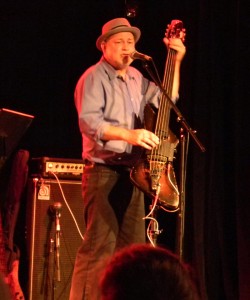 After some questions and answers Dave played a brief set of original solo material using a very unique approach. Tying into his theme of “individual entrepreneurship in a changing music scene” he used two basses, one on a stand and one he wore around his neck to create loops on the fly using a loop machine. He then sang tunes over the loop accompanying his performance on the second bass by playing secondary parts, fills and solos. It was an inspired performance that everyone seemed to thoroughly enjoy.
After some questions and answers Dave played a brief set of original solo material using a very unique approach. Tying into his theme of “individual entrepreneurship in a changing music scene” he used two basses, one on a stand and one he wore around his neck to create loops on the fly using a loop machine. He then sang tunes over the loop accompanying his performance on the second bass by playing secondary parts, fills and solos. It was an inspired performance that everyone seemed to thoroughly enjoy.
His portion of the night concluded, and the open jam began featuring a combination of Berklee alumni and others from the Nashville music community. The jam covered a lot of ground, everything from blues jams to original songs by some up-and-coming Nashville songwriters.
I would like to extend a big thank you to Dave Pomeroy for sharing his wisdom and music, Jack Zander for videotaping this event, The Rutledge, Berklee alumni volunteers Shantell Ogden, Heston Alley, Blake Branch, and everyone else who came out for this event. See you at the next one!
The Nashville Berklee Jam is held at The Rutledge on the last Monday of every other month, with the next event to take place on Monday, August 26 when I will be giving a talk about navigating the Nashville Music Industry
For more info about future events, please visit the Nashville Berklee Jam website NashvilleBerkleeJam.com
If you would like to learn more about the Nashville music industry, please check out my website and book “The Nashville Musician’s Survival Guide”.
Nashville Berklee Jam with Dallas Davidson – February 18, 2013 – Part II
By Eric Normand
We were only halfway through our very first Nashville Berklee Jam at The Rutledge and those in attendance had received some amazing perspective, and enjoyed an inspired performance from one of Nashville’s top songwriters, Dallas Davidson. After Dallas’s portion of the night was 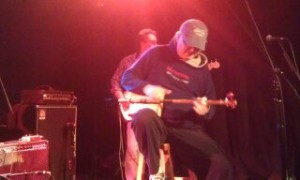 over we took a moment to reorganize and then began the open jam portion of this night.
over we took a moment to reorganize and then began the open jam portion of this night.
Among those who performed were alums, Amanda Williams (also one of the organizers of this event), Mason Stevens, who played a Delta blues instrument known as the “Diddly Bo”, drummers, John Rodrigue and Russell Garner, and bassist, Austin Solomon (Austin took a means solo in Cissy Strut). A few others from the Nashville music community also sat in on drums, Austin Marshall and Tom Drenon.
All the performances were strong and everyone who participated had a great time, but don’t take my word for it, check out the videos below to get a better idea of what can happen at The Nashville Berklee Jam!
The Nashville Berklee Jam is held at The Rutledge on the last Monday of every other month, with the next event to take place on Monday, April 29 featuring special guest, Bassist, Bryan Beller (Joe Satriani, Steve Vai, Mike Keneally) who will also be joined by his wife, Kira Small.
For more info about future events, please visit the Nashville Berklee Jam website NashvilleBerkleeJam.com
If you would like to learn more about the Nashville music industry, please check out my website and book “The Nashville Musician’s Survival Guide”.
Nashville Berklee Jam with Dallas Davidson, February 18, 2013 – Part I
By Eric Normand
A cold, damp rainy night wasn’t enough to stop Berklee alumni and others from converging on one of Nashville’s coolest venues, The Rutledge in what would be the first Nashville Berklee Jam to be held in downtown Nashville. Monday, February 18 marked the one-year anniversary of this event which had previously been held in the suburb of Kingston Springs, and the move to downtown aims to kick the event’s profile up a notch as this centrally located venue is perhaps one of the finest performance rooms in the city.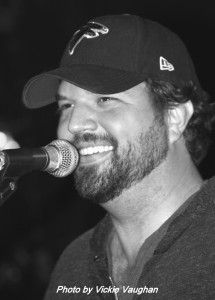
People began rolling in around 6:30, and the guest speaker on this night, 2012 NSAI, ACM, and BMI songwriter of the year, Dallas Davidson began his portion of the night shortly after 7:00 PM. Dallas, Rhett Akins, and Ben Haslip, make up the songwriting team known as “The Peach Pickers”, who in recent years have become the most successful songwriting team in the history of Nashville. Since moving to Music City from Albany, GA in 2004 Dallas has had over 100 of his compositions recorded including 13 number one hits – “Gimme That Girl”, “Just a Kiss”, “The One That Got Away”, and “I Don’t Want This Night to End”, to name a few.
I gave him a brief introduction, he spoke briefly about his journey to Nashville and how he got his start as an “in-the- trenches commercial songwriter”, and then he quickly got into some questions and answers.
In response to a question about naysayers along the way during the years leading up to his recent success, Dallas candidly responded:
“The list is long and distinguished… starting with my dad… [Laughs]… a lot of publishing companies passed on me, all of ‘em did… the first time around and the second time around.”
He went on to tell of how he got his first big break, a story which underscores the importance of a person’s character.
“A guy named Brett Jones actually signed me to a publishing deal. He started a company called Big Borassa, I was his first writer that he ever signed, and he swears that he didn’t even listen to my songs; he just got to know me and believed in me… I was very, very fortunate to have somebody like that guy come in there and give me a shot and write with me and teach me a lot of stuff.”
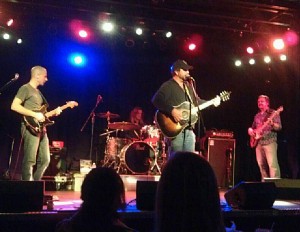 Dallas spoke about how he uses his small-town roots to provide topics to write about, as he wants to be “the mouthpiece” of his rural friends. He shared that he likes to write the melody first, then the groove before starting on the lyrics.
Dallas spoke about how he uses his small-town roots to provide topics to write about, as he wants to be “the mouthpiece” of his rural friends. He shared that he likes to write the melody first, then the groove before starting on the lyrics.
In response to “What advice would you give aspiring songwriters?” Dallas replied:
You’ve got to write a bunch of songs… I mean this in the friendliest, competitive way… your direct competition is me and Rhett Akins and were writing 100 to 150 songs a year… Work harder than us and believe in yourself, because that’s all we did… don’t take no for an answer…
Concluding his portion of the night was a mini set of four of his recent number one hits, which we were fortunate to capture on video (courtesy Jack Zander). The band behind him on this night consisted of the players who backed Dallas and Rhett Akins on the 2012 Luke Bryan Farm Tour – Tom Good on bass, Nick Forchione on Drums, and me on guitar. Dallas’s heartfelt performance was well received, and upon its conclusion I thanked him and took a few minutes to reorganize for the jam portion of this event (which will be explored in part two of this blog). Meanwhile, please enjoy the videos below from Dallas’s performance!
The Nashville Berklee Jam is held at The Rutledge on the last Monday of every other month, with the next event to take place on Monday, April 29 featuring special guest, Bassist, Bryan Beller (Joe Satriani, Steve Vai, Mike Keneally) who will also be joined by his wife, Kira Small.
For more info about future events, please visit the Nashville Berklee Jam website NashvilleBerkleeJam.com
If you would like to learn more about the Nashville music industry, please check out my website and book “The Nashville Musician’s Survival Guide”.
Nashville Berklee Jam with Rich Redmond – June 5, 2012
The latest Nashville Berklee Jam last Tuesday was a great success, thanks to all who attended! The weather was beautiful, so we had a very laid back talk outside on the patio at The Fillin’ Station, our usual location for this event. Rich Redmond, the guest speaker on this night, has worn a lot of hats during his 15 years in Nashville – session/touring drummer, producer, clinician, public speaker, and his hour-long talk gave all in attendance some great perspective into different ways to navigate the Nashville music industry.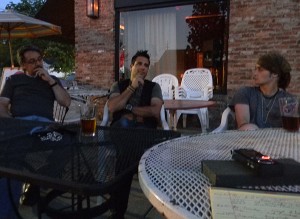
Rich spoke of the need to aggressively market yourself to find work in Nashville and how in his earliest days he obtained work by handing out demo cds of his drumming abilities to almost everyone he would meet around town. He candidly talked about those ‘lean years’, and that long before he was recording on hit records, touring the world with Jason Aldean, and producing acts like ‘Thompson Square’, he was hustling gigs on Broadway, playing in corporate party bands – whatever was necessary to insure survival.
For those who are just starting out in Nashville, he recommended that musicians “take every gig that’s offered”, as every new gig can potentially lead to new relationships and different career opportunities and that “If you give more to people then they expect, if you consistently exceed expectations, people are going to want to work with you.”
He spoke of the need to be ultra-professional by “always returning phone calls in a timely manner, always returning e-mails in a timely manner, being professional, being flexible, having the right gear to do the job and never mailing in a performance…”
Regarding the importance of reputation he said “You can have a great website, you can Tweet 1000 times a day, you can have a fantastic business card that’s got the really good paper, you know the really firm stuff that you have to pay extra for, and it’s still going to come down to word-of-mouth. In this [digital] age it’s so easy to be talked about in a positive or negative way, globally.”
During one part of the talk he mentioned a concept he refers to as “CRASH” a phrase he coined that stands for Commitment, Relationships, Attitude, Skill and Hunger – the five key ingredients he believes are necessary to succeed. He also spoke of the importance of defining your own success, a concept I talk about in my book “The Nashville Musician’s Survival Guide” (coincidentally, Rich contributed to the writing of this book).
After fielding several questions, he finished his talk and we all headed inside to make some music. Everyone who wanted to jam got a chance to sit in, and several great performances took place – ranging from classic rock covers to blues jams to originals. Rich stayed till the end making himself accessible to anyone who wanted to hang and chat, and during the middle of the jam he got behind the drum kit and played a few songs with me and several other alums. Here’s an MP3 of us playing a spirited version of the Jimi Hendrix classic, ‘Little Wing’
Audio clip: Adobe Flash Player (version 9 or above) is required to play this audio clip. Download the latest version here. You also need to have JavaScript enabled in your browser.
The night ended and we all headed home, but not until gathering for a group photo.
I want to thank everybody who came out and participated to make this another great event, see you at the next one! The next Nashville Berklee Jam will be held on Tuesday, July 10 – check back in a few days for info on the guest speaker for that night.
Nashville Berklee Jam with Judy Rodman – March 6, 2012
Our second “Nashville Berklee Jam” at The Fillin’ Station in Kingston Springs this past Tuesday was a great success! The guest speaker on this night was none other than Nashville’s award-winning vocal coach, Judy Rodman. Judy has played many a role in the Nashville music industry 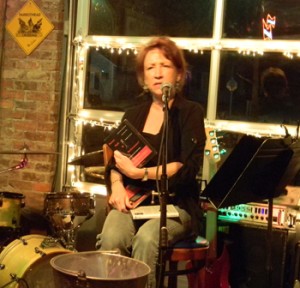 over the years – recording artist, A-list session singer, producer, hit songwriter – and on this night her talk focused on different career paths for vocalists. Judy was involved in the writing of my book “The Nashville Musician’s Survival Guide” and, backing up my theory of the necessity to “wear a lot of hats”, she talked about multiple streams of income for today’s musicians and artists. Among the potential jobs for vocalists she outlined were artists, live singers, and session singers (jingle singers, background vocals, demo singing, and voiceovers).
over the years – recording artist, A-list session singer, producer, hit songwriter – and on this night her talk focused on different career paths for vocalists. Judy was involved in the writing of my book “The Nashville Musician’s Survival Guide” and, backing up my theory of the necessity to “wear a lot of hats”, she talked about multiple streams of income for today’s musicians and artists. Among the potential jobs for vocalists she outlined were artists, live singers, and session singers (jingle singers, background vocals, demo singing, and voiceovers).
Here are a few excerpts:
“Recording artists need vocal ability, because the mark is up. Even with pitch fixing, rhythm fixing…your vocal needs to be as good as it possibly can be because it’s going to sound more natural and it’s going to be more emotionally compelling…You also need a ‘unique artist definition’…it’s not good enough to be just another great singer…you really need to be unique and find your own definition as an artist – your uniqueness, your vocal uniqueness – which means you need to explore your whole voice and your life experiences that you’re going to put into your art. The sound of your artistic definition is going to have to do with the sound of your voice, the choice of your instrumentation, and your message… Artistic definition takes exploration. For those of you wanting a career as a recording artist I would say don’t shortcut your experimentation.”
“For live background singing – you need to have the ability to trace and completely blend and go with the nuances of the voice of the singer you are looking to back…You’ve got to be able to change your sound as the artist wishes…you will of course have to have the ability to sing harmony parts and hear them… you have to have a specific look – whatever the artist is looking for. You need to network and find out who is gigging, who is in need of background vocalists.”
“Session singing…You need great vocal technique, usually you’ll need some vocal training…you really need to have surgical control of your voice for pitch, sound, blend and nuances –because time is money in the studio…You need to of course hear harmony parts quickly, you need to have the ability to read manuscript…but you also need to know the Nashville Number System.”
Judy then gave some practical vocal technique tips before answering several questions from alumni. Click on the following links if you would like to hear her talk in its entirety.
Audio clip: Adobe Flash Player (version 9 or above) is required to play this audio clip. Download the latest version here. You also need to have JavaScript enabled in your browser.
Judy Rodman Talk – Part 1 (21 min)
Audio clip: Adobe Flash Player (version 9 or above) is required to play this audio clip. Download the latest version here. You also need to have JavaScript enabled in your browser.
Judy Rodman Talk – Part 2 (21 min)
There is also a ton of useful and practical information for vocalists at Judy’s website www.judyrodman.com.
When her talk concluded we began the jam portion of the evening with our house band backing Judy for two songs to start things out. Her second tune, “One Way Ticket”, was a number one hit she wrote that was cut by LeAnn Rimes. Judy’s vocal performance was emotionally 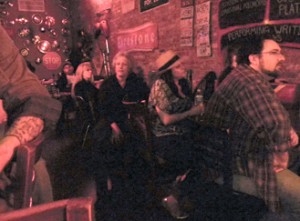 charged and inspiring to say the least, and this set the tone for the rest of the evening. A special dynamic on this night was the “optional vocal performance critique” that Judy offered for willing participants. To break the ice, I decided to go first and sang my two songs with the house band. After my first song, Judy pointed out some of the strengths about my performance and addressed a few things to work on.
charged and inspiring to say the least, and this set the tone for the rest of the evening. A special dynamic on this night was the “optional vocal performance critique” that Judy offered for willing participants. To break the ice, I decided to go first and sang my two songs with the house band. After my first song, Judy pointed out some of the strengths about my performance and addressed a few things to work on.
The jam continued with several great performances. Brian Lucas, the house keyboardist, sang a great rendition of “Georgia”, for which he took the vocal critique option. This pattern continued for the rest of the night, with literally every vocalist asking for a critique. Among these were Ted Schempp, the vocal duet “Acklen Park” (performing songs they co-wrote with alum, Shantell Ogden), Sarah Tollerson, and Michelle Lambert – all performing original material. After the first song by each performer, Judy offered critiques and then we would try a part of the song again, seeing instant improvement in the vocals (don’t 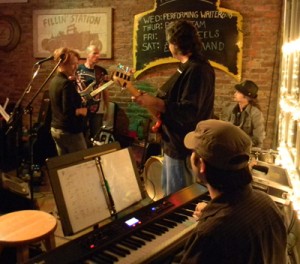 get me wrong, the vocal performances were pretty strong to begin with). Alums, Elton Charles on drums and Rick Carizales on guitar, also sat in and did a fine job backing up some of the guests. Brian Lucas made a big contribution by charting out many of the songs in advance, and Shantell helped out by taking photos and some great video excerpts (see below).
get me wrong, the vocal performances were pretty strong to begin with). Alums, Elton Charles on drums and Rick Carizales on guitar, also sat in and did a fine job backing up some of the guests. Brian Lucas made a big contribution by charting out many of the songs in advance, and Shantell helped out by taking photos and some great video excerpts (see below).
It really was a special evening, fun was had by all and I think everybody learned a few things too. I want to thank Judy Rodman, our house band (Heston Alley on drums, Tom Good on bass, Brian Lucas on keys) and all the alums who participated and helped make this a special evening, I can’t wait for the next one!
The next Nashville Berklee Jam will be held on Tuesday, April 10th at the Fillin’ Station with special guest, Reese Wynans, formerly of Stevie Ray Vaughn & Double Trouble. His talk will share perspective on being a lifelong career musician, working with SRV, and the importance of understanding blues and roots music. Please check our website regularly for updates.

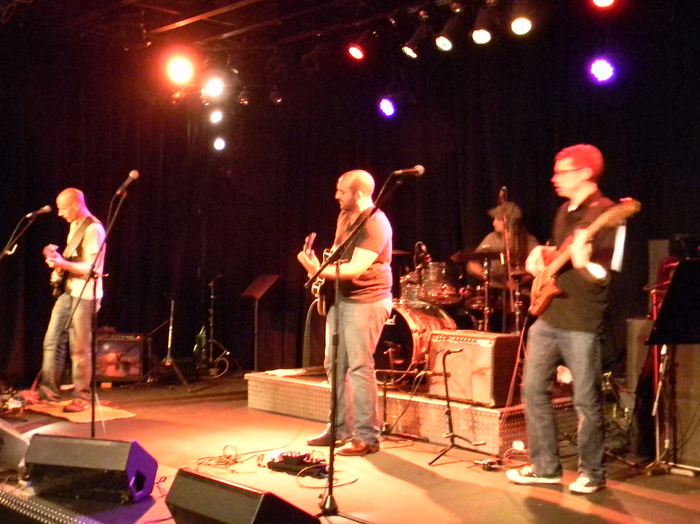
 Dallas Davidson Talk – 35 min
Dallas Davidson Talk – 35 min The One That Got Away
The One That Got Away Gimme That Girl
Gimme That Girl I Don’t Want This Night To End
I Don’t Want This Night To End Country Girl Shake It For Me
Country Girl Shake It For Me